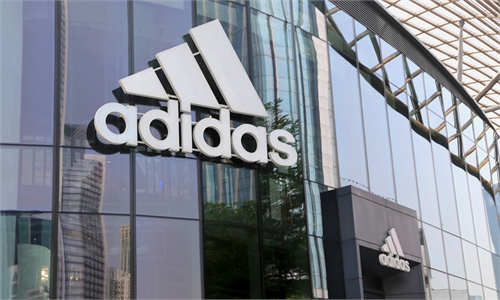
Adidas. Photo:IC
The German sportswear multinational adidas saw its Q2 revenue for the region, including the mainland, Hong Kong and Taiwan, drop to 1 billion euros ($1.174 billion), a decrease of 16 percent year-on-year, becoming the only region with negative revenue growth for the company in the quarter, media reports.
The explosive news put the company's poor performance at the top of China's Twitter-like platform Sina Weibo hot search list on Tuesday evening.
Against the backdrop of the fast development of local sports brand and the company's involvement in groundless forced labor claims in Northwest China's Xinjiang Uygur Autonomous Region, the significant drop on sales of the US branch is within expectations, industry insiders said.
The topic concerning adidas' sales drop drew up to 50,000 likes and over a thousand comments on Sina Weibo as Tuesday evening, with many saying the drop on sales can be even bigger.
Speaking about the fall of sales in the region, Kasper Rorsted, CEO of adidas AG, said, "we do see that the current market demand has been biased towards Chinese local brands rather than global brands," media reports.
However, industry insiders and some netizens believe that the alleged preference for Chinese local brands cannot be used as an excuse to disguise adidas' poor performance in China.
"The quality of its products is much worse than before, inferior to the quality of some domestic goods and the material looks very cheap," a netizen named Linjiadekaixin posted.
Another netizen said that "quality is one thing, and for some reason Nike and adidas seem to look worse than Chinese fashion brands in these past few years."
Hong Tao, Director of the Institute of Business Economics at the Beijing Technology and Business University, told the Global Times on Tuesday that the localization of sports brands is a trend not only in China but worldwide, and with the fast development of domestic sports brands on technology, material, fashion and design, their competitive advantages are no less than those of international brands.
Other factors that could contribute to the hit on its sales in China is its previous support to the boycott on cotton sourced from Northwest China's Xinjiang Uygur Autonomous Region over groundless claims of forced labor, an action that was considered a shot on the foot, industry insiders said, as the Chinese market becomes the most important for the company.
Against the fallout of the baseless claim of the so-called forced labor, H&M announced last month that sales in China fell 28 percent in the quarter, according to media reports.
The decline in sales of adidas in China is also a warning to other international brands, Hong noted.
"As a company, it should not participate in politics, especially for the purpose of distorting the facts to discredit China. But should pay more attention to how to provide better products and services to the market," said Hong.


